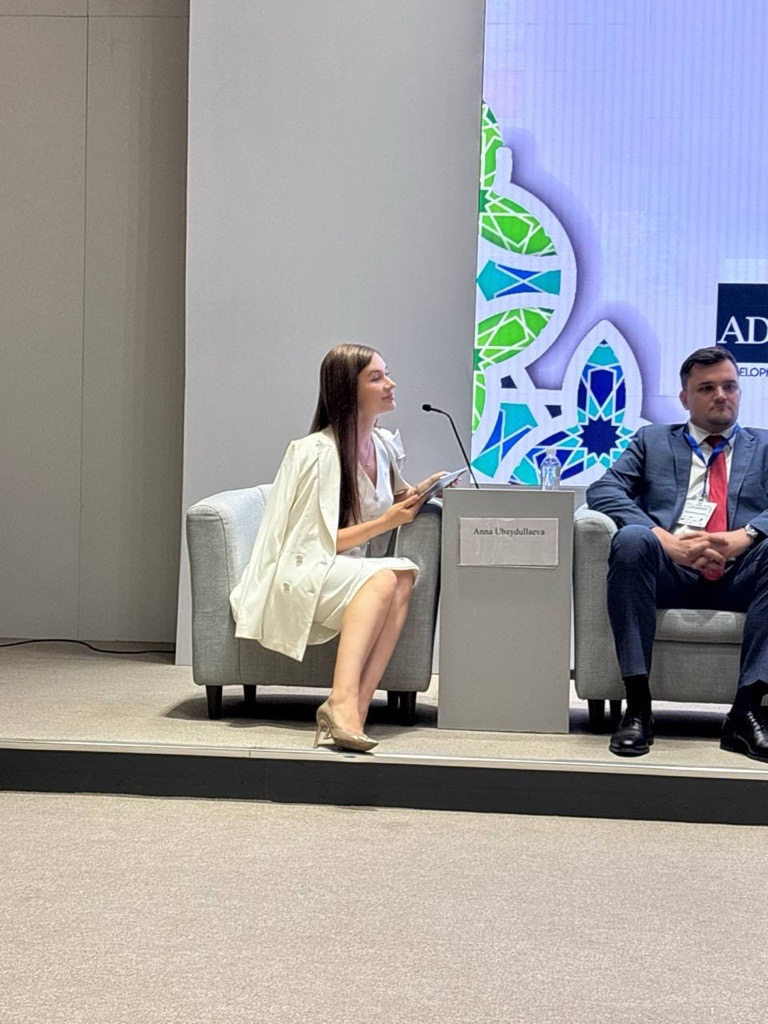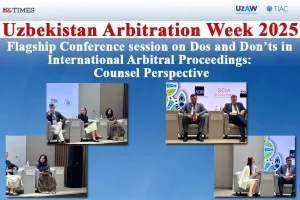The 5th edition of the Uzbekistan Arbitration Week (UzAW) 2025 is currently taking place from 23 to 26 September 2025 in Tashkent. The event was jointly organised by the Chamber of Commerce and Industry of the Republic of Uzbekistan and the Tashkent International Arbitration Centre (TIAC), and brought together leading arbitration practitioners, judges, and industry experts from around the world.
Uzbekistan continued to consolidate its position as a reliable seat for international arbitration. The adoption of the UNCITRAL Model Law on International Commercial Arbitration had been a transformative milestone, strengthening the country’s legal framework and enhancing its credibility as a neutral and effective dispute resolution venue.
As part of the Uzbekistan Arbitration Weekend 2025, the flagship conference on “DOs and DON’Ts in International Arbitral Proceedings: Counsel Perspective” brought together leading arbitration practitioners from across the globe to share practical insights and strategies for navigating complex international disputes. The session was designed to equip legal professionals with a deeper understanding of best practices, common pitfalls, and effective advocacy in arbitral proceedings.
The discussion featured a distinguished panel of experts, including:
-
Neeti Sachdeva (Mumbai Court of International Arbitration)
-
Bakhyt Tukulov (TKS Disputes)
-
Anton Maltsev (Melling Voitishkin & Partners)
-
Daria Kuznetsova (CMS Cameron McKenna Nabarro Olswang LLP)
-
Tom Cameron (Carter Ruck Solicitors)
-
Konstantin Ksenofontov (Pinna Goldberg).

The session was ably moderated by Ms.Anna Ubaydullaeva (Tashkent State University of Law), who guided a nuanced conversation on practical challenges, procedural efficiencies, and strategies for effective representation in international arbitration.
Ms. Anna an international arbitrator at SIAC and expert in Turkish Arbitration Law, opened the session by highlighting that effective arbitration advocacy extends beyond presenting facts or citing legal rules. She emphasised the importance of persuading the tribunal, establishing credibility, strategically managing proceedings, and emphasising key points. She remarked that advocacy is not about winning every point but persuading the tribunal on matters that truly influence the outcome. She welcomed the distinguished panel and encouraged participants to ask questions during the session to enrich the discussion.
“Our aim today is not only to exchange technical knowledge, but also to uncover impactful insights, share illustrative examples and highlight practical lessons. We want to offer you not just abstract principles, but also concrete advice and practical insights that can inspire seasoned practitioners while providing young lawyers with valuable tools they can currently apply in their practice”
Through a mix of presentations, case studies, real-world examples, and expert commentary, the conference highlighted the critical importance of meticulous preparation, strategic advocacy, and adherence to procedural norms to ensure fair, timely, and cost-effective dispute resolution. This flagship session underscored Uzbekistan’s growing role as a hub for international arbitration in Central Asia and set the stage for meaningful dialogue on enhancing the country’s dispute resolution ecosystem.
Daria Kuznetsova, Senior Associate in the Litigation and Arbitration Team at CMS London, began her presentation with a focus on the drafting of arbitration clauses, stressing that careful drafting at the negotiation stage is critical. She noted that poorly drafted clauses can lead to additional costs, delays, and enforceability issues. She advised consulting dispute lawyers or referring to modern clauses provided by arbitral institutions as best practices.
“Arbitration clauses are often called champagne clauses. They are negotiated at a time when everyone is about to open a bottle of champagne and celebrate a close deal.They are quite often overlooked at the negotiation stage”
She also emphasised the importance of preserving contemporaneous evidence, cautioning against over-reliance on witness testimony alone. She illustrated this with a case where a key witness was unavailable, highlighting that robust documentation ensured the case’s success.
“Do engage with your client early on in the proceedings. Do consider the strategy. Do discuss the procedural timelines, the steps involved, the course implications, because quite often, especially when representing respondents, you see the dispute that probably should have never come to arbitration, either because it should have been settled early on, or because the dispute just has no chance of winning.”
Finally, Daria stressed early engagement with clients, discussing strategy, procedural timelines, potential outcomes, and costs. She noted that a clear understanding of client goals can prevent unnecessary arbitration and facilitate timely settlements. When asked about the DO with the greatest long-term impact, she emphasised strategy and preservation of factual evidence as decisive for the success of a case.
Key Takeaways from Daria Kuznetsova:
-
Careful drafting of arbitration clauses.
-
Preservation of contemporaneous evidence.
-
Early engagement and expectation management with clients.
Ms. Anna then introduced Konstantin Ksenofontov, counsel at Pinna Goldberg, who contributed his insights on practical arbitration strategies and reinforced the points raised by Daria regarding front-end planning, drafting, and client management. Konstantin highlighted the need for strategic advocacy from the very start of arbitration, ensuring that procedural, factual, and legal considerations are meticulously managed to maximize the chances of a favorable outcome.
Mr. Tom Cameron was the next speaker. He brought with him extensive experience in high-value commercial and investment arbitrations across London and Paris, with particular expertise in the energy, metals, and mining sectors.
Mr. Cameron emphasised the critical importance of considering enforcement from the very outset of an arbitration. He observed that winning every argument is futile if the award cannot be effectively enforced. Early planning should include identifying the counterparty’s assets, considering steps to freeze or attach assets, and strategising jurisdictionally to maximize the likelihood of successful enforcement. He noted that jurisdictions like England and the Netherlands offer particularly favorable regimes for pre-judgment attachment.
“Its important as lawyers, as the legal team, to have a clear and simple narrative to persuade the tribunal as to why a particular asset or investment would have been successful or risky.”
He also stressed the importance of structuring claims carefully, ensuring that they are directed against parties that hold the assets necessary to satisfy the award. In complex transactions, counsel may need to explore doctrines such as implied consent to include non-signatories who have materially participated in the contract’s negotiation or performance.
On procedural conduct, he highlighted damages assessment and expert evidence management as often overlooked but critical aspects of successful arbitration. He illustrated this with a detailed case involving a disputed DCF (discounted cash flow) valuation, showing how the lack of a joint expert model initially delayed the proceedings and complicated the tribunal’s decision-making. He underlined that managing expert evidence effectively, presenting a simple narrative, and emphasising contemporary documentation can significantly influence tribunal persuasion and decision-making.
Mr. Cameron’s practical advice included:
-
Stay focused on core issues that affect outcomes.
-
Plan enforcement strategies from the outset rather than as an afterthought.
-
Maintain procedural flexibility to adapt across both common law and civil law traditions.
-
Manage expert evidence and damages assessment proactively to ensure like-for-like comparisons and avoid unnecessary delays.
His session reinforced the overarching theme of the conference: that strong arbitration advocacy begins long before hearings, through meticulous planning, strategic foresight, and effective client and procedural management.
Following Tom Cameron’s insights, Ms. Niti Sachdeva took the floor. A pioneer in shaping India’s arbitration landscape, she is also actively engaged in academia, regularly serves as an arbitrator, and brings a wealth of experience in bridging both practical and academic perspectives in international commercial arbitration
Ms. Sachdeva opened her session with a relatable analogy, comparing arbitration to an ‘Uzbek Chaikhana’, emphasising the importance of balance and precision. She noted that for every “do” in arbitration, there exists a corresponding “don’t,” stressing the importance of strategic and measured advocacy. Her session focused on the do’s and don’ts of arbitration in India, providing practical guidance for counsel navigating India-related disputes.
“Arbitration is like an Uzbek Chaikhana. Everything works best in balance.The tea must be strong, but not bitter. The Samsa fresh, but not burnt. Similarly, in arbitration for every do, there is a don’t”
She highlighted ten key “do’s” along with corresponding “don’ts”:
-
Do trust the process — India’s courts are increasingly pro-arbitration, respecting party autonomy and upholding awards.
Don’t assume delay is inevitable — International arbitration in India has become significantly faster, with some disputes resolving in less than 18 months. -
Do embrace diversity — Within MCIA, roughly 40% of appointments are women, reflecting a conscious effort toward inclusivity.
Don’t underestimate the local touch — Engaging Indian counsel is crucial to navigate local procedures, compliance, and contractual nuances. -
Do rely on courts for support — Courts act as referees, providing robust enforcement mechanisms and interim relief.
Don’t fear the courts — Modern Indian courts intervene only when necessary, ensuring fair procedural support without overreach. -
Do engage with arbitral institutions — Institutions like TIAC and MCIA provide world-class case management and procedural support.
Don’t assume ad hoc is the only way — Ignoring institutional frameworks overlooks evolving best practices and collaborative opportunities. -
Do understand Bar Council of India regulations — Foreign lawyers can advise and participate in international arbitration but cannot argue in Indian courts.
Don’t treat India as a free-for-all — Compliance with local legal boundaries is essential. -
Do respect timelines and time zones — Efficient case management is critical, and arbitrators’ schedules must be respected.
Don’t assume time zones are elastic — Arbitrators and clients expect adherence to local time practices. -
Do plan for enforcement from the start — India is a signatory to the New York Convention, and courts are pro-enforcement while observing public policy considerations.
Don’t ignore local enforcement nuances — Understanding procedural and cultural context is vital for successful award recognition. -
Do prepare for hybrid hearings — India increasingly hosts hybrid proceedings, especially for cross-border disputes.
Don’t assume one-size-fits-all — Local customs and institutional preferences may differ between jurisdictions and even cities. -
Do build credibility with tribunals — Honest advocacy is paramount in India.
Don’t rely on theatrics or gamemanship — Unlike courtroom theatrics, arbitration requires measured, fact-based persuasion. -
Do think of India as a hub, not a hurdle — Engage with the arbitration community, attend events, and build networks.
Don’t ignore India — Leaving India out of an international arbitration strategy risks overlooking key procedural and practical opportunities.
Her session offered invaluable practical insights for counsel engaging with India-related disputes, reinforcing procedural awareness, cultural sensitivity, and the strategic integration of enforcement and institutional practices in arbitration.
The session concluded with a note of practical wisdom and strategic foresight, highlighting that effective arbitration advocacy begins long before the hearing itself.
Collectively, the speakers conveyed a unifying principle: arbitration success relies on preparation, clarity, and strategic foresight at every stage, from drafting the arbitration clause to enforcement of the award. The session offered a unique blend of global best practices and jurisdiction-specific guidance, providing both seasoned practitioners and emerging lawyers with concrete tools and insights to approach international arbitration with confidence, efficiency, and effectiveness.
The discussion reaffirmed that arbitration is not merely a legal exercise but an art of persuasion, planning, and judicious execution, and the combined insights of the distinguished panel will continue to guide practitioners in achieving optimal outcomes in complex cross-border disputes.

